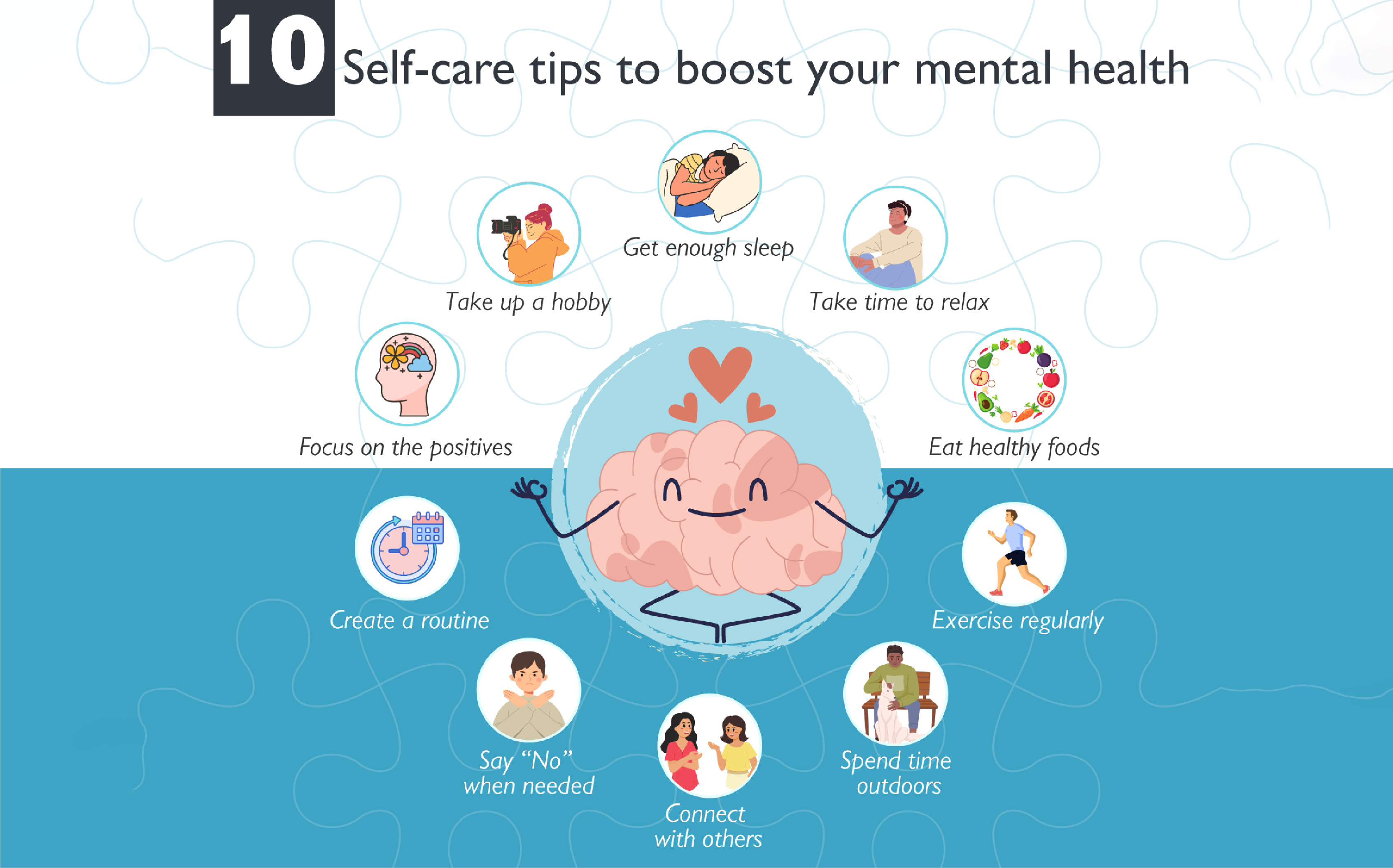Sound mental health means psychological, social, and emotional wellness. Self-care involves dedicating time to activities that improve both your physical and emotional well-being, helping you lead a fulfilling life.
Doing so can boost your energy, reduce your risk of illness, and help you manage stress. Your daily life can be significantly impacted by even simple self-care activities. It has an impact on our thoughts, emotions, and behaviours. It also influences how we respond to stress, interact with people, and make decisions. From childhood and youth through adulthood and aging, mental health is crucial at every stage of life.
Managing stress, maintaining a journal, mediating, and other strategies might help you shift your thinking and guide your thoughts in a certain direction. You wish to master your thoughts, then. Perhaps you wish to adopt a more optimistic outlook after a year of physical separation or want to stop worrying about a recent breakup. Unwanted thoughts can lead to a great deal of pain and frustration. You're not the only one who wants to get rid of them. It's normal to feel depressed and stay stressed, thereby struggling to persuade yourself to look up.
Let’s explore how to attain sound mental health just by making some changes in our lifestyle. Although true mind control is fictional, you can try to alter your perspective. It might take your effort to learn certain tricks of regaining control, but the following 10 strategies below can help.
Read Also: The 5 Most Common Mental Disorders: What You Need to Know?
 10 Ways to Improve Mental Health
10 Ways to Improve Mental HealthTo live a happy and healthy life, we all need to be in a state of good mental health and wellbeing. Here are seven areas of life where minor adjustments can have a significant impact. Why not get started right now? Explore how to maintain good mental health, following are the key tips:
Read Also: Factors to Consider While Choosing the Best Rehab Center in Hyderabad
It should go without saying that before you can start to regulate your thoughts, you must first identify what they are. It's common to experience occasional low moods or setbacks, but persistent emotional struggles may need attention. Maintaining control over spiralling thoughts or your general mindset may be even more difficult if you're going through some difficult times right now. It's also rather common to have intrusive ideas sometimes. Although they can be upsetting, they usually go away as soon as they've interfered, especially if you refrain from letting it weigh on their mind.
If your symptoms are severe or upsetting and have persisted for two weeks or longer, get expert assistance. Some of such symptoms include:
Read Also: Multiple Sclerosis Treatment in Hyderabad
There is no one definition of mental wellness. We may use it to discuss how we're feeling, how well we're handling day-to-day situations, or what feels possible at the moment. Good mental health doesn’t mean feeling happy all the time. It’s about resilience and managing challenges effectively. Alternatively, you may believe that your experiences have little impact on you. And being in good health does not always imply that you don't have a mental health problem. You may have a mental health problem but are currently doing well. Alternatively, you may not have a mental health disorder but are now experiencing difficulties with your wellbeing. Poor mental health might make it more difficult to manage daily living.
Enhance your mental well-being with 10 expert tips from Walk Again, India’s leading neurorehabilitation center. Take care of your mind and book a consultation with our mental health specialists today!
Q1: Why is mental health important?
A: Mental health is essential for overall well-being, influencing how we handle stress, build relationships, and make life decisions.
Q2: How can physical activity help mental health?
A: Exercise releases endorphins, the brain's "feel-good" chemicals. It reduces stress, anxiety, and depression while improving mood and self-esteem.
Q3: What role does nutrition play in mental health?
A: A balanced diet supports brain health, helping to improve focus, memory, and overall mood.
Q4: How does sleep impact mental health?
A: Lack of sleep can increase stress, anxiety, and irritability. Consistent, quality sleep (7-9 hours nightly) supports emotional balance and mental clarity.